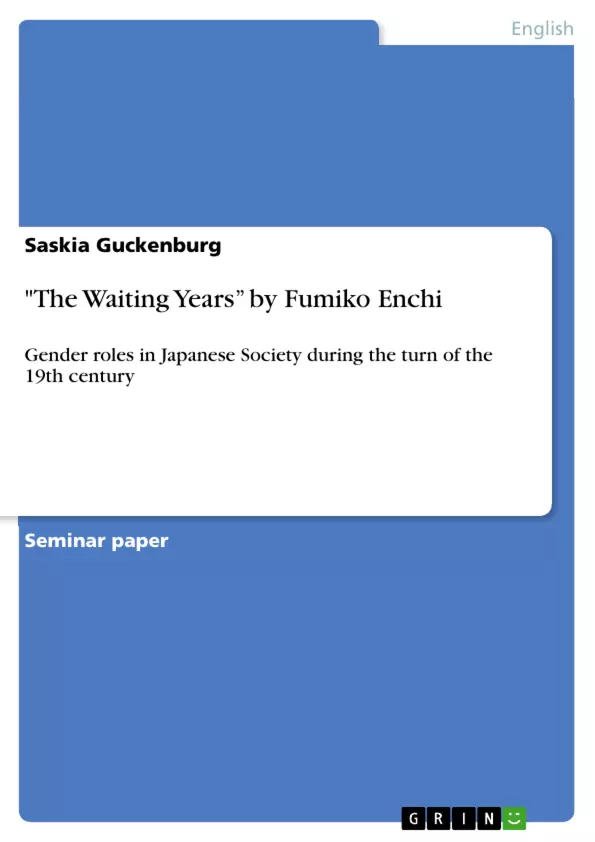Fumiko Enchi has worked on Onnazaka for eight years, which has been translated to English under the title of The Waiting Years. The novelist-critic Takami Jun describes it as “a rare jewel among masterpieces of modern literature”.
The novel reveals how the family system of Meiji Japan (1868-1912) leads to an exploitation of the women and treats various problems which the protagonist Tomo Shirakawa faces. The role of the concubines provides a profound double structure. The novel is a fictional transfor-mation of Enchi’s grandmother Ine’s painful life who endured a polygynous marriage with a man from a samurai family. The protagonist’s suffering and pain expresses Enchi’s own pro-test against the system and the maltreatment of women.
First published in pieces in journals, it came out in a book form in 1957. During that time women were resisting the government to reintroduce the traditional Japanese family system. Enchi published several critical novels in the late 1960s criticizing the patriarchal social order. The novel won the Noma Literary Prize, one of Japan’s most prestigious literary awards. Usually the prize is only given to one work, but in 1957 it was awarded jointly to this novel and to Uno Chiyo’s Ohan, which glorifies women’s submissiveness to her husband as a true feminine virtue. In this way, women opposing the “ie” system and men supporting it should both be pleased.
To understand the situation of Japanese women during the Meiji period it is necessary to ana-lyze men’s behavior and to reveal the political and historical background. Therefore, the first section of the paper deals with men’s roles. The second section deals with the depiction of women.
Inhaltsverzeichnis (Table of Contents)
- Introduction, Summary...
- The World of Men
- Yukitomo
- Historical Political Context
- Public and Private Face
- Michimasa
- Yukitomo
- The World of Women
- Women in Confucian thought
- Situation of the Wife: Tomo
- Tomo's Growth...
- Influence of Buddhism
- Liberation for Tomo
- Discourse on Polygny
- Historical Background
- Suga and Yumi
- Men's attitude towards concubinage
- Motherhood
- Tomo and Etsuko
- Suga
- Toshi and Kin, a maleless household
- Conclusion….........
Zielsetzung und Themenschwerpunkte (Objectives and Key Themes)
This paper analyzes Fumiko Enchi's novel The Waiting Years, exploring the complex portrayal of gender roles in Japanese society during the Meiji period (1868-1912). The novel, based on the author's grandmother's experiences, sheds light on the challenges faced by women within a patriarchal family system.
- The exploitation of women within the family system of Meiji Japan
- The role of concubines and the double structure they create
- The clash between traditional Confucian values and changing social realities
- The historical and political context of the Meiji period
- The portrayal of female agency and resistance to patriarchal norms
Zusammenfassung der Kapitel (Chapter Summaries)
The first chapter introduces the novel's protagonist, Tomo Shirakawa, and her marriage to Yukitomo. It delves into the historical and political context of the Meiji period, highlighting the ongoing struggle for women's rights and the pressures of modernization.
The second chapter examines the character of Yukitomo, focusing on his public and private personas. It reveals how his political ambitions and social status lead to the exploitation of women and his ambivalent feelings towards Tomo.
The third chapter shifts its attention to the world of women in Meiji Japan, exploring their experiences within the Confucian framework. The chapter analyzes Tomo's journey as a wife, the influence of Buddhism on her perspective, and the implications of polygny within the society.
Schlüsselwörter (Keywords)
The key focus of this work is on gender roles, family systems, and the historical context of Meiji Japan. It delves into themes of female agency, social expectations, and the impact of Confucianism on women's lives. The novel's portrayal of polygny, prostitution, and women's resistance to societal pressures are crucial aspects of the analysis.
Frequently Asked Questions
What is the central theme of Fumiko Enchi's "The Waiting Years"?
The novel explores the exploitation of women within the patriarchal family system of Meiji-period Japan (1868-1912).
Is the story based on real events?
Yes, it is a fictional transformation of the painful life of Enchi’s grandmother, who endured a polygynous marriage in a samurai family.
How did Confucianism affect women in the Meiji period?
Confucian thought emphasized women's submissiveness to men, reinforcing a social order where wives often had to tolerate concubines and lack of agency.
What does the role of concubines signify in the novel?
It represents a "profound double structure" where women were forced to compete or coexist under the authority of a single patriarch, leading to immense suffering.
Why was the novel significant when it was published in 1957?
It was released at a time when Japanese women were resisting government efforts to reintroduce traditional, patriarchal family systems.
- Quote paper
- Saskia Guckenburg (Author), 2011, "The Waiting Years” by Fumiko Enchi, Munich, GRIN Verlag, https://www.grin.com/document/187467



